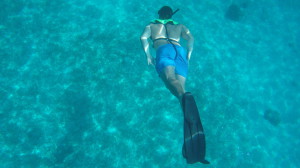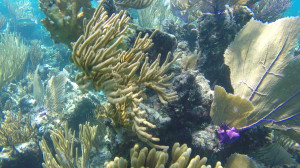 This summer, I was fortunate enough to be invited to spend a week in the Bahamas to participate in a week-long Yoga Retreat with my amazing girlfriend. As great as the Yoga was, we weren’t going to end the trip without sneaking away to do some snorkeling.
This summer, I was fortunate enough to be invited to spend a week in the Bahamas to participate in a week-long Yoga Retreat with my amazing girlfriend. As great as the Yoga was, we weren’t going to end the trip without sneaking away to do some snorkeling.
For those of you who haven’t snorkeled before, it is an incredible experience that I highly recommend. All you need are basic swimming skills and the ability to breathe through a snorkel. As I explored the reefs, it occurred to me how similar the controlled breathing techniques required of snorkelers are to many meditative breathing methods used to relax, like Pranayama yoga. Breathing through a tube involves resistance and requires a lot more exertion than free breathing, especially after diving when you purge the water from your snorkel by explosively exhaling, much like a Whale blowing water out of its blowhole.
 People of all ages and sizes can quickly and easily learn to snorkel. It doesn’t require undergoing extensive training or lugging around bulky and heavy equipment.
People of all ages and sizes can quickly and easily learn to snorkel. It doesn’t require undergoing extensive training or lugging around bulky and heavy equipment.
Snorkeling is a recreational pastime that can passively get you closer to your fitness goals. It can also help relieve stress and anxiety. Mental health expert Cristina Desa says, “Snorkeling can increase self-confidence through the release of endorphins.”
If you haven’t snorkeled before and are still unsure as to whether you have what it takes, most certifying agencies require that you meet a standard similar to the following one before they can certify you. If you have a pool available to you, test yourself and see where you are in compared to the standards.
- Swim 200 yards (approximately four lengths of an Olympic-size pool).
- Submerge your head and open your eyes under water.
- Stay afloat for 10 minutes without snorkeling gear or outside assistance.
- Swim underwater for 15 yards without gear and without pushing off the side of the pool.
Snorkeling isn’t just an excellent form of exercise; it is also the easiest way to witness the beauty of underwater life. The Caribbean reefs are particularly special, made more so by the rate at which they are disappearing. Despite being vital to the region’s economy and supporting the more than 43 million people, they’re under siege by increased temperatures and ocean acidity from carbon dioxide. According to an article published by the Guardian, most Caribbean coral reefs will disappear within the next 20 years.
Here’s a short clip from when we snorkeling. It’s not from the reef, but rather from just snorkeling along the beach by the retreat. We spotted a fish shadowing a sting ray along the bottom, swimming directly on top of it. If you’re a marine biologist or otherwise just know why, I would love to hear an explanation.